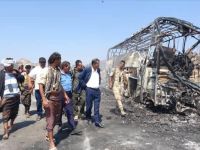Villagers killed three Abu Sayyaf guerrillas when the gunmen tried to seek sanctuary from Philippine troops sent to rescue 17 hostages, police sources said Wednesday.
They said some of the slain gunmen are believed to have taken part in the April 23 raid on a Malaysian diving resort from where a group of tourists and resort staff were snatched and taken to the southern Philippine island of Jolo.
Police found the guerrillas' mutilated bodies in the village of Lapa near Maimbung town late Tuesday, the sources said. It was unclear how they were killed, but the corpses appeared to have been violated with machete blows.
The three are among the latest casualties in the 12-day-old military offensive against the Muslim extremist Abu Sayyaf group which is still holding 17 hostages including an American and three Malaysians in Jolo.
They were with a group of Abu Sayyaf members who reportedly tried to seek refuge in the village late Tuesday.
The residents refused to let the gunmen enter their area, sparking a clash which left the three dead, said police sources who helped take the bodies to the town hall so that their relatives could identify them.
While Jolo town itself was peaceful, fighting was still raging in Patikul and Talipao towns, two strongholds of the Abu Sayyaf, the military said.
The army was no longer using air strikes or artillery to blast the Abu Sayyaf positions because the troops were closing in on the hostages and did not want to risk hurting them, a government intelligence source said.
The fighting was limited to ground operations, the source said.
Government television put the toll at 109 guerrillas and two soldiers dead and more than 30,000 civilians displaced since the assault was launched on September 16.
None of the Abu Sayyaf's major leaders have been captured although one of them, veteran Muslim guerrilla Radulan Sajiron is believed seriously wounded.
A defense department source said that the authorities have pinpointed the location of the three Malaysian hostages but would not give details -- JOLO, Philippines (AFP)
© 2000 Al Bawaba (www.albawaba.com)







